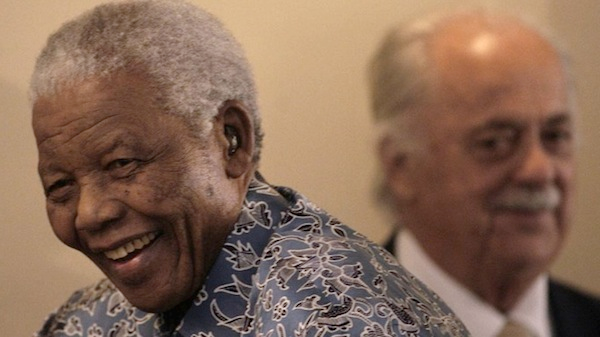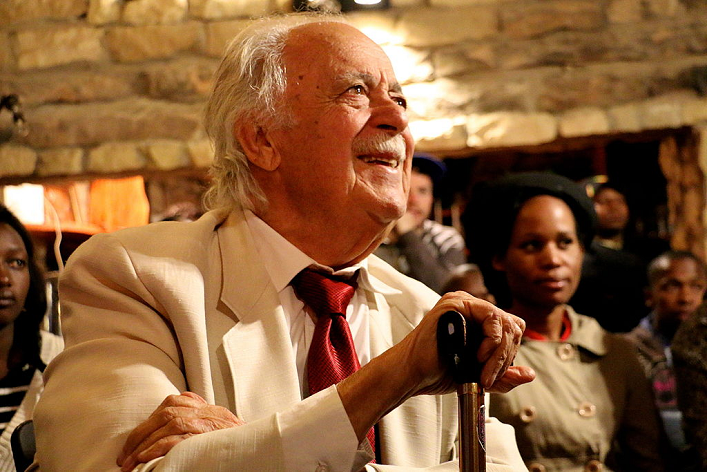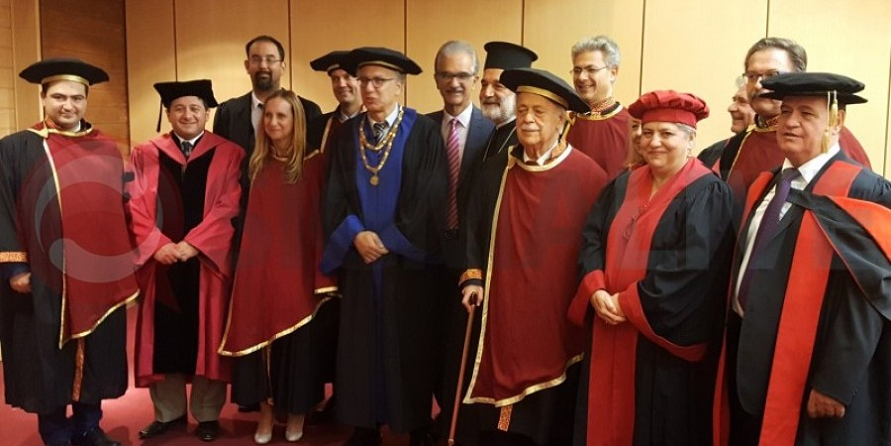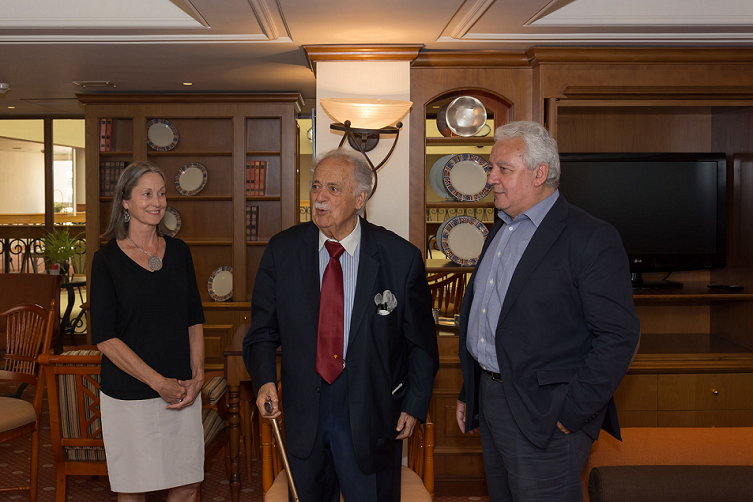“Can Cyprus Become A United Country?”
“Greece is the Mother of Democracy. South Africa is its youngest daughter”.
- By: George Bizos SC *
So said Nelson Mandela shortly after his release after twenty seven years of imprisonment.
His answer to the question would have been “yes, it can”.
He was no stranger to Hellenism.
He was a graduate of Arts and Law.
He played the role of Creon in Sophocles’s play “Antigone” whilst in prison.
He had read Plato, Thucydides, Aristotle, Zenon and others whilst a student and as an attorney the Roman, the English, the American, the French and the African Traditional Law.

We met as students in 1948 and became close friends who protested against the black students’ treatment by the leading University of Witwatersrand in Johannesburg and the documentary laws of Apartheid when I qualified as an Advocate in 1944. Nelson and his partner Oliver Tambo regularly briefed me to defend their clients for contravening the Apartheid Laws.
The massacre of many Black protestors in 1960 at Sharpeville and the protests that followed led to the African National Congress and its leadership including Nelson Mandela going underground. He was convicted and sentenced to five years imprisonment. Whilst serving he was charged with more serious offences in what was named the Rivonia Trial in which he was expected to be sentenced to death together with nine others. I was one of the defence counsel. Nelson wanted to say from the dock that he was prepared to die for freedom of the Black and other disadvantaged people in South Africa.
I tried to dissuade him and I quoted Socrates’s response when offered a different punishment to the Athenian Assembly which had the effect of increasing the majority of those who had proposed the death sentence. Socrates’ suggestion that he should be free for his service to Athens led to the opposite effect. Nelson compromised by adding the words “if needs be” before saying that he was prepared to die. The real reason why he and his co-accused were not sentenced to death was, most likely, the protests throughout the World that they must be freed.
The release of all of them by February 1991 was the probable reason.

The fall of the Apartheid Regime was written on the wall.
The release of most political prisoners was a triumphant start of the beginning of Democracy in South Africa.
For almost four years of negotiations amongst all political parties, particularly between the National Party led by Mr de Klerk and the African National Congress led by Mr Mandela led to an agreement of what the Constitution of the new South Africa would be like after it was to be drafted by a Parliament elected by all South Africans. Eventually a final Constitution was agreed upon and the newly appointed Constitutional Court certified that it was consistent with the thirty four Democratic Principles agreed to by the political parties at the Convention for a Democratic South Africa (CODESA). This was a negotiating forum between the government and all other political parties which included previously outlawed organisations which were in opposition to apartheid.
A Constitutional Committee was formed consisting of African National Congress members who had fled out of South Africa, some who were jailed for many years and lawyers who had formed “Lawyers for Human Rights” during the later years of apartheid rule.
We held public meetings throughout South Africa and visited about fifteen countries, particularly those whose population spoke different languages, practiced different religions and varied numerically and who, despite these differences, lived peacefully in a democratic society.

At one of our early committee meetings Mr Mandela said we should make sure that we wrote a constitution that we could live with even if we lost the first democratic elections.
The preamble of the Constitution of South Africa reads:
“PREAMBLE”
“We, the people of South Africa, recognise the injustices of our past;
Honour those who suffered for justice and freedom in our land;
Respect those who have worked to build and develop our country; and
Believe that South Africa belongs to all who live in it, united in our diversity.
We therefore, through our freely elected representatives, adopt this Constitution as the supreme law of the Republic so as to –
Heal the divisions of the past and establish a society based on democratic values, social justice and fundamental human rights;
Lay the foundation for a democratic and open society in which government is based on the will of the people and every citizen is equally protected by law;
Improve the quality of life of all citizens and free the potential of each person; and
Build a united and democratic South Africa able to take its rightful place as a sovereign state in the family of nations.
May God protect our people.
Nkosi Sikelel’ iAfrika. Morena boloka setjhaba sa heso.
God seen Suid-Afrika. God bless South Africa.
Mudzimu fhatutshedza Afurika. Hosi katekisa Afrika.”
There are thirty five further sections dealing with the various human rights. Section 36 of the Constitution provides:
- “The rights in the Bill of rights may be limited only in terms of law of general application to the extent that the limitation is reasonable and justifiable in an open and democratic society based on human dignity, equality and freedom, taking into account all relevant factors, including –
- The nature of the right;
- The importance of the purpose of the limitation;
- The nature and extent of the limitation;
- The relation between the limitation and its purpose; and
- Less restrictive means to achieve the purpose.
- Except as provided in subsection (1) or in any other provision of the Constitution, no law may limit any right entrenched in the Bill of Rights.”
I may not be fully aware of the problems faced by the people of Cyprus. In many respects however, there are some which are similar to those we had to face in South Africa.
We have ten official languages which may be used by Government and respected by all and another ten (including Greek) to be promoted and respected. (Section 6 of the Constitution)
“Languages
- The official languages of the Republic are Sepedi, Sesotho, Setswana, siSwati, Tshivenda, Xitsonga, Afrikaans, English, isiNdebele, isiXhosa and isiZulu.
- Recognising the historically diminished use and status of the indigenous languages of our people, the state must take practical and positive measures to elevate the status and advance the use of these languages.
- a) The national government and provincial governments may use any particular official languages for the purposes of government, taking into account usage, practicality, expense, regional circumstances and the balance of the needs and preferences of the population as a whole or in the province concerned; but the national government and each provincial government must use at least two official languages.
- b) Municipalities must take into account the language usage and preferences of their residents.
- The national government and provincial governments, by legislature and other measures, must regulate and monitor their use of official languages. Without detracting from the provisions of subsection (2), all official languages must enjoy parity of esteem and must be treated equitably.
- A Pan South African Language Board established by national legislation must –
- Promote and create conditions for, the development and use of –
- All official languages;
- The Khoi, Nama and San languages; and
- Sign language; and
- Promote and ensure respect for –
- All languages commonly used by communities in South Africa, including German, Greek, Gujarati, Hindi, Portuguese, Tamil, Telegu and Urdu; and
- Arabic, Hebrew, Sanskrit and other languages used for religious purposes in South Africa.
Section 15 provides for freedom of religion:
“Freedom of religion, belief and opinion
- Everyone has the right to freedom of conscience, religion, thought, belief and opinion.
- Religious observances may be conducted at state or state-aided institutions, provided that –
- Those observances follow rules made by the appropriate public authorities;
- They are conducted on an equitable basis; and
- Attendance at them is free and voluntary.
- (a) This section does not prevent legislation recognising –
- marriages concluded under any tradition, or a system of religion, personal or family law; and
- systems of personal and family law under any tradition, or adhered to by persons professing a particular religion.
(b) Recognition in terms of paragraph (a) must be consistent with this section and the other provisions of the Constitution.”
Section 16 provides for freedom of expression:
“Freedom of expression
- Everyone has the right to freedom of expression, which includes –
- Freedom of the press and other media;
- Freedom to receive or impart information or ideas;
- Freedom of artistic creativity; and
- Academic freedom and freedom of scientific research.
- The right in subsection (1) does not extend to –
- Propaganda for war;
- Incitement of imminent violence; or
- Advocacy of hatred that is based on race, ethnicity, gender or religion, and that constitutes incitement to cause harm”
Section 19 provides for political rights:
“Political rights
- Every citizen is free to make political choices, which includes the right –
- To form a political party;
- To participate in the activities of, or recruit members for, a political party; and
- To campaign for a political party or cause
- Every citizen has the right to free, fair and regular elections for any legislative body established in terms of the Constitution.
- Every adult citizen has the right –
- To vote in elections for any legislative body established in terms of the Constitution, and to do so in secret; and
- To stand for public office and, if elected, to hold office.”
Section 30 provides for language and culture:
“Language and culture
Everyone has the right to use the language and to participate in the cultural life of their choice. But no one exercising these rights may do so in a manner inconsistent with any provision of the Bill of Rights.”
Section 31 provides cultural, religious and linguistic communities:
“Cultural, religious and linguistic communities
- Persons belonging to a cultural, religious or linguistic community may not be denied the right, with other members of that community –
- To enjoy their culture, practise their religion and use their language; and
- To form, join and maintain cultural, religious and linguistic associations and other organs of civil society.
- The rights in subsection (1) may not be exercised in a manner inconsistent with any provision of the Bill of Rights.”
Section 34 provides for access to courts:
“Access to courts
Everyone has the right to have any dispute that can be resolved by the application of law decided in a fair public hearing before a court or where appropriate, another independent and impartial tribunal or forum.”
We sing our new national anthem in four different languages. Can the people of Cyprus sing a new anthem in both languages?

We in South Africa managed in Zulu, Sesotho, Afrikaans and English.
Our sporting teams and school children sing the four verses with “gusto”.
Historically there can be no doubt that Cyprus has been primarily a Greek land from ancient times.
The occupation of Greece for almost four hundred years led to a minority of Turks chose to live on what was previously ancient and Byzantine. A minority of Turks has lived in Cyprus for centuries. We are not unmindful of the problems and at times enmity between the two communities. However, there were also the periods of peaceful coexistence and harmony. Cypriots of Muslim faith lived throughout the island side by side with the Christians.
Cyprus became a British Colony not accepted by the Greek majority who aspired to unify with Greece. Colonisers tend to promote the policy of “divide and rule”. So when the Greek Cypriots started demonstrating their wish to unify with Greece in the 1930s, 1940s and 1950s, the colonialists also started instigating and creating animosity and friction between the two communities. In parallel they reminded Turkey of the Muslim minority in Cyprus.
Following the Greek guerrilla war of 1955-1959, the British decided to limit their presence on the island within two military bases and Cyprus was declared an independent state in 1960 with a Greek Cypriot president and Turkish Cypriot vice president. Recommendations by the president Archbishop Makarios in 1963 to improve the functioning of the government were rejected by Turkey and the Turkish Cypriots. This was followed by the battle at Kokkina and an intensified animosity and separation of the two communities.
Turkey claimed to be the protector of the Turkish speaking Muslim minority and invaded the northern part of the island after a failed military coup de tat against president Makarios which was orchestrated by the military junta in Athens. Forty thousand soldiers occupied Northern Cyprus and they are still here.
Almost all Turkish speaking Cypriots left the South as Greek speaking Cypriots fled from the North. Both sides have left their homes and their properties.
The Turkish occupation and subsequent declaration of Northern Cyprus as an independent state has not been recognised by the United Nations and the international community.
Prior to Turkish intervention Cyprus had a reasonably effective Human Rights Constitution which is not recognised by the military occupying the North.
Turkey is not being received as a member of the European Union nor as a member of certain UN bodies, one of the main reasons being the unlawful occupation of a portion of the island which is a member state.
Surely all Greek and Turkish Cypriots want to return to their homes and fields that they were ejected from. It may be thought of as a difficult task, but if we in South Africa managed to do it under the Presidency of Nelson Mandela for over 20 years then the people of Cyprus may be able to establish a new independent united country, for the benefit of all and peaceful co-existence between the two groups.
- George Bizos SC
A recognised and world
known Human Rights Lawyer
Legal Resources Centre, Johannesburg, South Africa.
